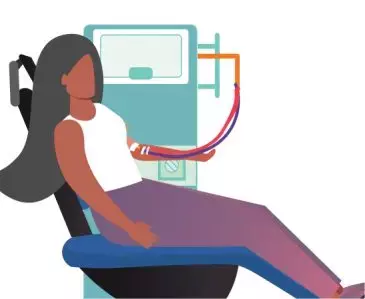- Home
- Medical news & Guidelines
- Anesthesiology
- Cardiology and CTVS
- Critical Care
- Dentistry
- Dermatology
- Diabetes and Endocrinology
- ENT
- Gastroenterology
- Medicine
- Nephrology
- Neurology
- Obstretics-Gynaecology
- Oncology
- Ophthalmology
- Orthopaedics
- Pediatrics-Neonatology
- Psychiatry
- Pulmonology
- Radiology
- Surgery
- Urology
- Laboratory Medicine
- Diet
- Nursing
- Paramedical
- Physiotherapy
- Health news
- Fact Check
- Bone Health Fact Check
- Brain Health Fact Check
- Cancer Related Fact Check
- Child Care Fact Check
- Dental and oral health fact check
- Diabetes and metabolic health fact check
- Diet and Nutrition Fact Check
- Eye and ENT Care Fact Check
- Fitness fact check
- Gut health fact check
- Heart health fact check
- Kidney health fact check
- Medical education fact check
- Men's health fact check
- Respiratory fact check
- Skin and hair care fact check
- Vaccine and Immunization fact check
- Women's health fact check
- AYUSH
- State News
- Andaman and Nicobar Islands
- Andhra Pradesh
- Arunachal Pradesh
- Assam
- Bihar
- Chandigarh
- Chattisgarh
- Dadra and Nagar Haveli
- Daman and Diu
- Delhi
- Goa
- Gujarat
- Haryana
- Himachal Pradesh
- Jammu & Kashmir
- Jharkhand
- Karnataka
- Kerala
- Ladakh
- Lakshadweep
- Madhya Pradesh
- Maharashtra
- Manipur
- Meghalaya
- Mizoram
- Nagaland
- Odisha
- Puducherry
- Punjab
- Rajasthan
- Sikkim
- Tamil Nadu
- Telangana
- Tripura
- Uttar Pradesh
- Uttrakhand
- West Bengal
- Medical Education
- Industry
Serum Hepcidin-25 Independently Predicts Mortality in Maintenance Hemodialysis patients: Study

Serum hepcidin-25 could be an independent predictor for all-cause mortality in Maintenance Hemodialysis patients, according to recent study.
Serum hepcidin-25 could be an independent predictor for all-cause mortality in Maintenance Hemodialysis (MHD) patients, according to a study published in Dovepress.
Hepcidin plays an important role in regulating iron levels; it inhibits intestinal iron absorption and iron release from hepatocytes and macrophages. Iron deficiency may result in severe anemia whereas iron overload results in production of toxic oxidants which may cause multiple organ damage. It is due to this reason that iron status should be regularly monitored in patients undergoing Maintenance Hemodialysis (MHD). Since hepcidin-25 regulates iron metabolism, it can be used as a supplement for evaluating functional iron deficiency.
With this background, a prospective observational cohort study was carried out by the Department of Nephrology at the Xuzhou Medical University, China to investigate the associations between hepcidin-25 and mortality in MHD patients.
A total of 161 patients undergoing Maintenance Haemodialysis were included in the study, with a 2 year follow-up. The median value of baseline serum hepcidin-25 was 31.0 (12.1, 57.3) ng/mL. So, the patients were divided into two groups - low-level hepcidin-25 group, and high-level hepcidin-25 group. The relationships between various variables including serum hepcidin-25, demographic characteristics as well as certain other clinical parameters, was investigated.
The study revealed that the serum iron, serum ferritin, transferrin saturation (TSAT), and hsCRP were higher, pre-dialysis creatinine and albumin were lower, and the scores of health-related qualities of life were worse in the high-level hepcidin-25 group than in the low-level hepcidin-25 group. The patients with hepcidin-25< 31 ng/mL had better survival outcomes during the 24-month follow-up. It was also evident that serum hepcidin-25 was associated with ferritin, TSAT, and all-cause mortality.
"Serum hepcidin-25 was associated with ferritin and TSAT, and could be an independent predictor for all-cause mortality in MHD patients. Further research with larger sample size and longer-term follow-up is still needed," the investigators concluded.
Reference:
Study titled, "Serum Hepcidin-25 and All-Cause Mortality in Patients Undergoing Maintenance Hemodialysis," as published in Dovepress.
Medical Dialogues Bureau consists of a team of passionate medical/scientific writers, led by doctors and healthcare researchers. Our team efforts to bring you updated and timely news about the important happenings of the medical and healthcare sector. Our editorial team can be reached at editorial@medicaldialogues.in.
Dr Kamal Kant Kohli-MBBS, DTCD- a chest specialist with more than 30 years of practice and a flair for writing clinical articles, Dr Kamal Kant Kohli joined Medical Dialogues as a Chief Editor of Medical News. Besides writing articles, as an editor, he proofreads and verifies all the medical content published on Medical Dialogues including those coming from journals, studies,medical conferences,guidelines etc. Email: drkohli@medicaldialogues.in. Contact no. 011-43720751


